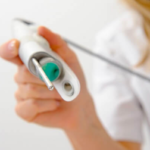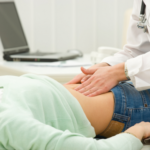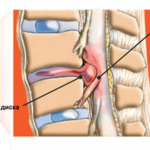How is the resorption of a hernia of the spine
Many patients are wondering if a vertebral hernia can resolve without intervention? It is impossible to give an unambiguous answer to this question, since it is necessary to understand the mechanism of pathology formation and take into account the degree of its progression. Not always hernias resolve themselves and require the intervention of surgeons.
General principles of the physiology of the disease
Intervertebral hernia is an extremely common disease in the modern world. For its formation, it is enough for a person, without making efforts to lead a sedentary lifestyle and neglect the recommendations regarding a healthy diet. Also, the damage to the intervertebral space is often facilitated by work associated with the constant pulling of weights, some congenital diseases of the connective tissues.
The intervertebral disc is a small formation, which is a kind of insert between the vertebrae, providing cushioning and smooth movements. It is the pathological processes in this disc that lead to the formation of pathology.
Intervertebral hernia - what is it? This is a specific protrusion of the nucleus pulposus of the disc into the surrounding tissues. It occurs due to the fact that the rigid fibrous ring is too unstable to external influences. Only the ridge can be affected by pathology, since intervertebral discs exist only there.
Hernias can form both in several places, and in one.
The second option in medical practice is somewhat more common. The main symptoms of the disease develop due to the fact that the nucleus pulposus presses on the surrounding tissues, interfering with the flow of normal metabolic processes in them.
The course of hernia resorption
Can a spinal hernia resolve without intervention? In principle, this is possible.
Best of all, regenerative processes are in young people. It is the young people who are faced with a defect who manage to cope with the pathology without surgery.
This is explained very simply. In order for the hernia to resolve, it is necessary to actively feed the intervertebral disc through the vessels. In young people, these vessels are still fully active and are able to fully provide the area of pathology with blood.
If the regeneration is complete, then a small hernia will resolve so quickly and easily that the patient will not even remember that he has ever suffered from it.
But after all, the defect occurs mainly not in young people, but in adulthood and old age. And everyone knows that in this case, hernias do not resolve on their own. The whole point, again, in the processes of regeneration. The older a person is, the more difficult it is for him to have all the processes aimed at restoring the body and, accordingly, the less likely he is to heal himself.
It is important to remember that the defect resolves only if the spine is not overloaded with additional loads. But is it possible to avoid loads for a person who is forced to go to work every day and perform any loads there? Naturally, in this case, one should not expect that the defect between the vertebrae will resolve itself.
What therapy can speed up the process
Even if the hernia is very small and can conditionally pass by itself, without the intervention of doctors, it is still necessary to help your own body. This can be done by contacting a doctor and using several different methods.
So, how to help the hernial protrusion disappear, thereby alleviating your condition?
The following approaches are recommended:
- reducing the load during the period of exacerbation of the disease (while the patient is suffering from acute pain, he is recommended to be at rest and get out of bed in exceptional cases, but as soon as the most intense pain passes, it is worth starting to move);
- the use of medications (to alleviate one's own condition, the use of non-steroidal anti-inflammatory drugs and local analgesics is recommended);
- the use of massage (again, as soon as the exacerbation with an acute pain attack can be eliminated, you can and should contact masseurs who can improve the general condition of the lumbar spine and the entire column as a whole); physiotherapy techniques (like massage, physiotherapy is used when exacerbation passed, and helps to activate the regeneration processes, which will contribute to the speedy resorption of the spinal hernia).
Some patients, seeking to effectively fight the disease, use the methods of traditional medicine. They are also allowed to be used after consulting a doctor, without abandoning traditional methods of therapy.
It is important to remember that effective resorption of a hernia is possible only if the patient will apply several approaches to the fight at the same time.
When you should not count on solving the problem without intervention
Sometimes it happens that, despite all the efforts of the patient, the hernia does not think to resolve, continuing to disturb him. So when is it better to agree to surgical treatment, and not torturing yourself with conservative therapy?
The protrusion will not pass on its own in those patients who do not make any effort to get rid of the cause of the disease. Today, unfortunately, such a picture in medical practice is common. The patient knows that he is ill and the condition of the spinal cord is at risk due to a hernia, but he stubbornly ignores the doctor's orders, continuing to lead a sedentary lifestyle, for example.
Self-disappearance will not resolve the pathology that has developed in a patient whose age has crossed the mark of 60 years. In this case, the regenerative processes in the tissues are already too slow, and the body needs outside help to function normally.
Without intervention, it is unlikely that a lesion of the cervical spine, which, although quite rare, is considered a severe pathology, will do. Also, you should not count on therapy without surgery if the patient has a pronounced narrowing of the spinal canal and the growth of osteophytes. If a person has been suffering from a hernia for the last 7-10 years, and has abruptly decided to undergo a course of treatment, it is also practically impossible to count on recovery without serious interventions.
Intervertebral hernia is a pathology that requires careful identification and proper selection of therapy.
Patients are not allowed to self-medicate if they really want to cope with their disease and lead a full life again. It is impossible to carry out conservative therapy anyhow, if you really do not want to go under the knife of the operating surgeon.










